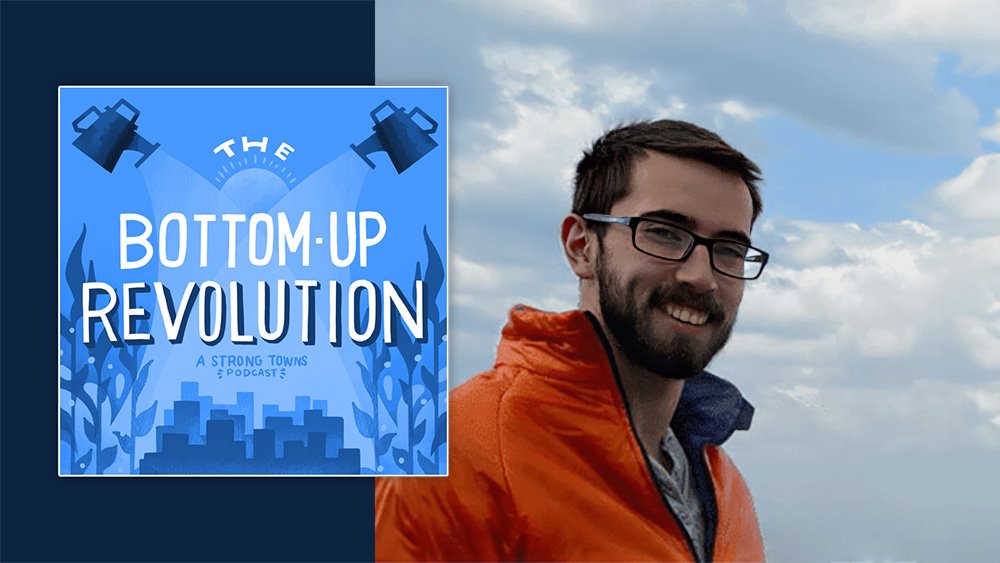Kip Santos is a trained civil engineer and construction manager who quit his job to build Local Conversations full-time. Now he splits his time between the U.S. and Canada, nurturing the groups he's founded and building missing middle housing. (Transcript included.)
Read MoreCities thrive when residents actively participate in conversations about their future. Whether through public comment or the written word, speaking up isn’t just an act of protest—it’s an act of stewardship. Here’s how one Albuquerque resident advocated for more housing in his city.
Read MoreTiffany is joined by Montana Gau, a Local Conversation leader in Denver. They discuss how Gau built the group into a registered nonprofit with several hundred members and how his role shifted from advocating “on the ground” to creating a space where others can more effectively advocate. (Transcript included.)
Read MoreDavid Jenkins is a city councilor and Local Conversation leader in La Plata, Maryland. He joins Norm to discuss his work with the city’s budget, particularly his efforts to share financial information in a simple way that lets residents participate in the budgeting process. (Transcript included.)
Read MoreIn this Bottom-Up Short, Norm is joined by Christian Schick, a Local Conversation leader from Virginia. His group has built a lot of momentum in the past year, and Schick talks about how they did that in a productive and helpful way, particularly while juggling local elections. (Transcript included.)
Read MoreIn this episode, Norm is joined by Andrew and Anna Carley, Local Conversation leaders from Michigan. They discuss how they became one of the go-to groups that city officials turn to when they’re considering policy changes.
Read MoreHere’s how Strong Towns Chicago is making its neighborhoods safer, more pedestrian-friendly and more inviting.
Read MoreIn this episode, Local Conversation leader Michael Bassili explains how his group created a parking campaign that convinced their city council to eliminate parking mandates in their downtown.
Read MoreFletcher Williams was hit by three cars in a 13-month period — all within a half-mile radius in Bradenton, Florida. And he’s only one of many crash victims. The design of these streets is inhumanely dangerous and must be changed.
Read MoreIn this episode, host Norm Van Eeden Petersman is joined by Jake Loftis, a pastor and Local Conversation leader. They discuss the ways that North America’s built environment can lead to social isolation and how Loftis used his local paper to combat that isolation.
Read MoreIn Blair, Nebraska, Jake Loftis and his Local Conversation are turning the idea of New Year’s resolutions into a powerful tool for community transformation.
Read MoreIn this episode, host Tiffany Owens Reed is joined by Chloe Groome and Aaron Feldman, co-leads of the Local Conversation group Strong Towns Chicago, to discuss the initiatives their group is working on and their coalition strategy for driving change.
Read MoreIn this episode, host Norm Van Eeden Petersman is joined by Sully Israel, a Local Conversation leader, to discuss his group’s efforts to keep their city’s main street closed to cars.
Read MoreIn this episode, host Norm Van Eeden Petersman is joined by Julie Emery, a Local Conversation leader, to discuss how her group started their bus bench building program and how it’s evolving.
Read MoreHere’s how advocates in Omaha, Nebraska, got their Department of Public Works to complete a quick-build street safety project so fast that “it felt like waving a magic wand.” (Hint: Find out if your community has a business improvement district, stat.)
Read MoreIn this episode of Bottom-Up Shorts, host Norm Van Eeden Petersman is joined by Sarah, a Local Conversation leader, to talk about the bike racks she and her friends have been building and installing around their city.
Read MoreIn this debut episode of Bottom-Up Shorts, host Norm Van Eeden Petersman is joined by Manav Sharma, a Local Conversation leader, to discuss his group’s use of stickers in their advocacy.
Read MoreChuck is joined by Norm Van Eeden Petersman, Strong Towns’ director of membership and development, in this special Member Week episode to discuss the history of the Strong Towns movement and how members have brought it to heights Chuck never could’ve imagined.
Read MoreAll Strong Towns members have a hero origin story — an experience that compelled them to get off the sidelines and into the game, to start making things better in their communities. Here are some of those stories. What was yours?
Read MoreYamini Karandikar is the leader of Strong Towns San Antonio, a Local Conversation in Texas. She joins this episode of The Bottom-Up Revolution to discuss her experience with conducting a Crash Analysis Studio and the impact it’s had on her community.
Read More



















